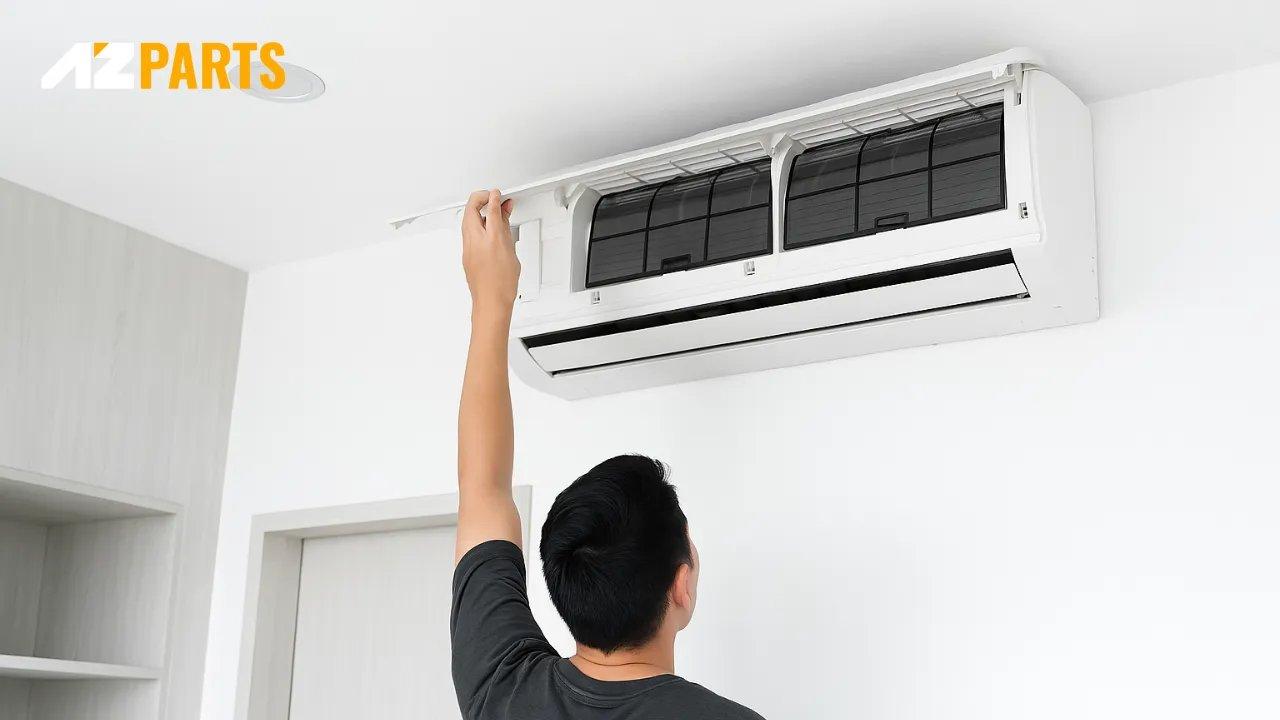Review
AC Capacitors: What They Are? Why They Are Important?
AZparts Team
Updated on July 9, 2025
9 min read
The AC capacitor is a crucial component of the air conditioning system that many homeowners don't understand until something goes wrong. Whether you're experiencing unusual sounds from your unit or noticing higher energy bills, understanding what an AC capacitor does can help you identify and resolve issues before they become costly repairs. At AZParts, we specialize in providing high-quality replacement parts for all your air conditioning needs, ensuring your system runs efficiently year-round.
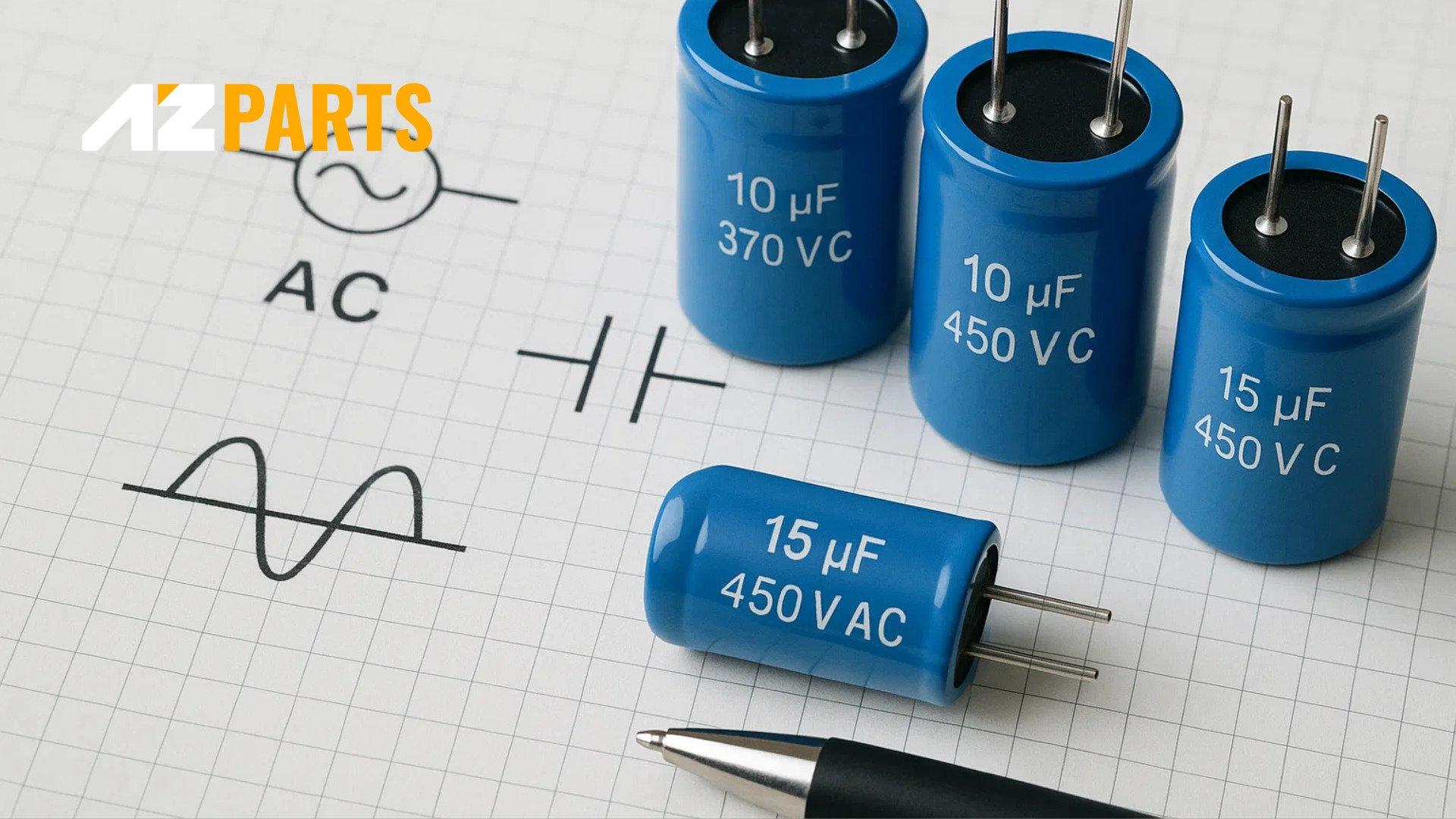
1. What Is an AC Capacitor?
An AC capacitor is a cylindrical electrical component that stores and releases electrical energy to help start and run your air conditioning system's motors. Think of it as a temporary battery that provides the extra electrical boost needed to get heavy-duty motors spinning. These capacitors are typically housed in a metal canister and contain two conductive plates separated by an insulating material called a dielectric.
Capacitors are measured in microfarads (μF), which indicates their storage capacity. Most residential AC units use capacitors ranging from 5 to 80 microfarads, depending on the motor size and power requirements. The capacitor's voltage rating must also match your system's specifications to ensure safe and proper operation.
These components are designed to handle the demanding electrical loads of air conditioning systems, where motors need significant power to overcome initial resistance and maintain consistent performance. Without a properly functioning capacitor, your AC motors would struggle to start or may not start at all.
The lifespan of an AC capacitor typically ranges from 10 to 20 years, though factors like heat exposure, electrical surges, and manufacturing quality can significantly impact longevity. Regular maintenance and timely replacement are essential for optimal system performance.
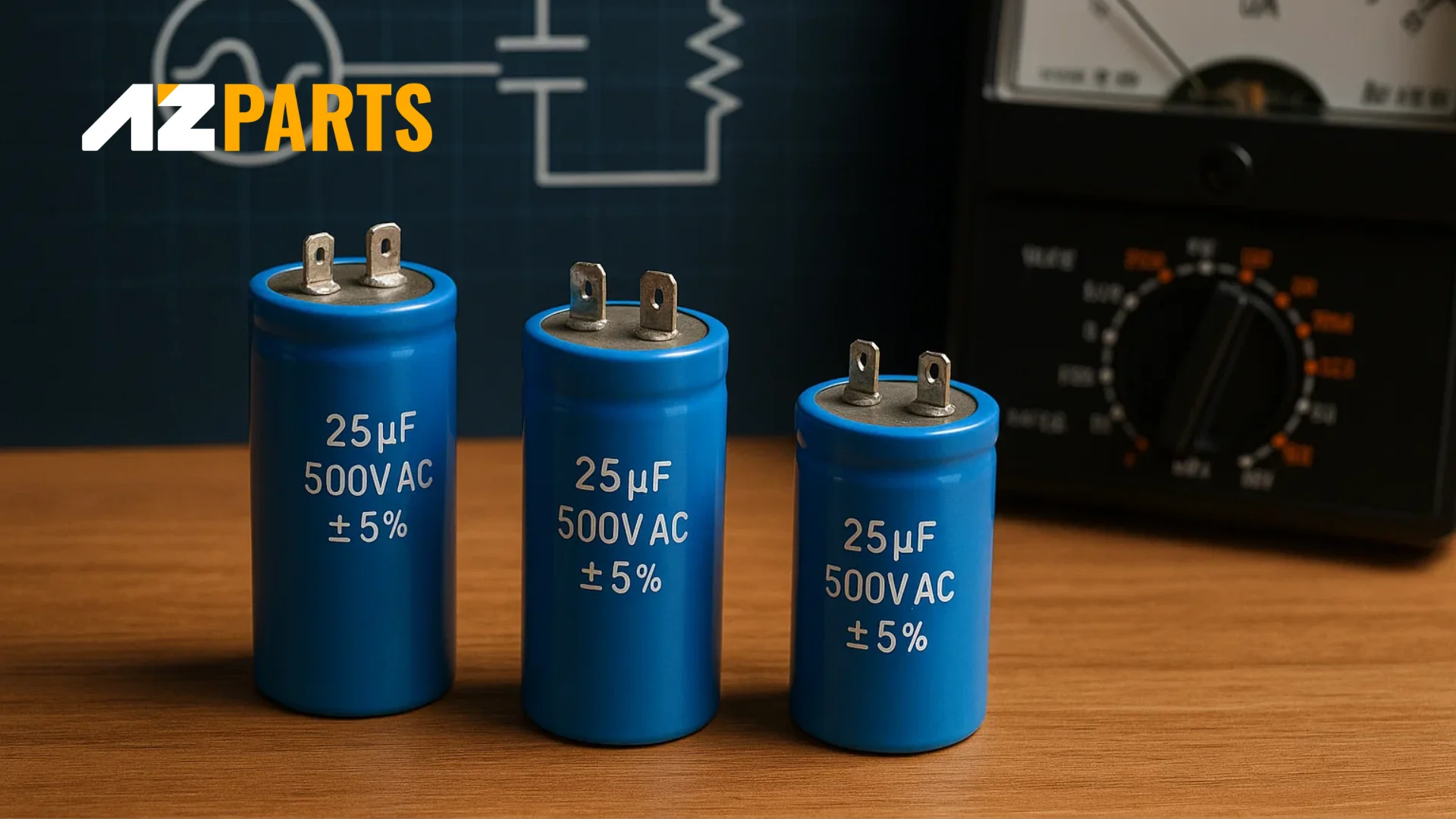
What Is an AC Capacitor? (Source: AZParts)
2. What Does an AC Capacitor Do?
AC capacitors serve two primary functions in your air conditioning system: providing starting torque and maintaining consistent motor operation. When you turn on your AC, the capacitor releases stored electrical energy to give motors the initial power surge needed to overcome inertia and begin rotating.
During the starting phase, capacitors deliver a concentrated burst of electricity that can be several times the normal running current. This surge creates the magnetic field necessary to generate rotational force in the motor's rotor. Without this initial boost, the motor would simply hum without turning, potentially causing damage from overheating.
Once the motor reaches operating speed, capacitors continue to provide electrical phase shift that maintains smooth operation. They help create the rotating magnetic field that keeps motors running efficiently, reducing vibration and ensuring consistent performance throughout the cooling cycle.
Capacitors also help improve power factor and reduce electrical consumption by ensuring motors operate at optimal efficiency. This translates to lower energy bills and reduced strain on your electrical system. When capacitors begin to fail, motors work harder to achieve the same results, leading to increased power consumption and potential component damage.
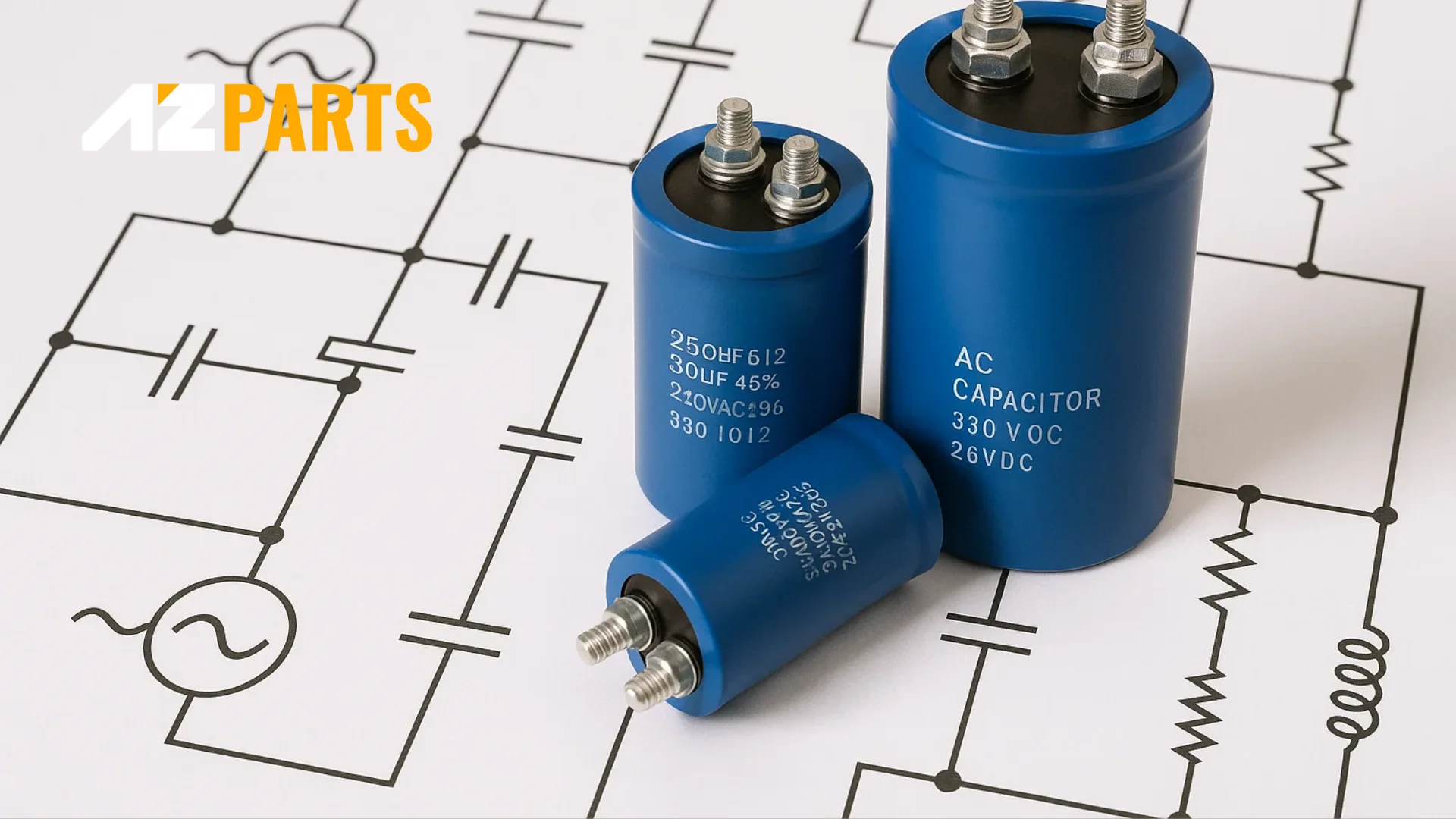
What Does an AC Capacitor Do? (Source: AZParts)
3. Start Capacitor vs. Run Capacitor
Understanding the difference between start and run capacitors is crucial for proper AC maintenance and troubleshooting. Start capacitors are designed for short-term, high-energy bursts during motor startup. They typically have higher microfarad ratings and are only active for a few seconds while the motor reaches operating speed.
- Start capacitors disconnect from the circuit once the motor achieves approximately 75% of its rated speed, accomplished through a centrifugal switch or relay. These capacitors are built to handle intense electrical loads but are not designed for continuous operation. Attempting to keep a start capacitor in the circuit during normal operation will cause it to overheat and fail quickly.
- Run capacitors, on the other hand, remain in the circuit throughout the entire operating cycle. They have lower microfarad ratings compared to start capacitors but are designed for continuous duty. Run capacitors help maintain motor efficiency, reduce noise, and provide consistent torque during operation.
Some AC systems use dual-run capacitors that combine both start and run functions in a single unit. These capacitors have multiple terminals and serve both the compressor and fan motor simultaneously. If you're looking for reliable replacement capacitors, AZParts offers a comprehensive selection of air conditioner parts including various air conditioner capacitor to meet your specific system requirements.
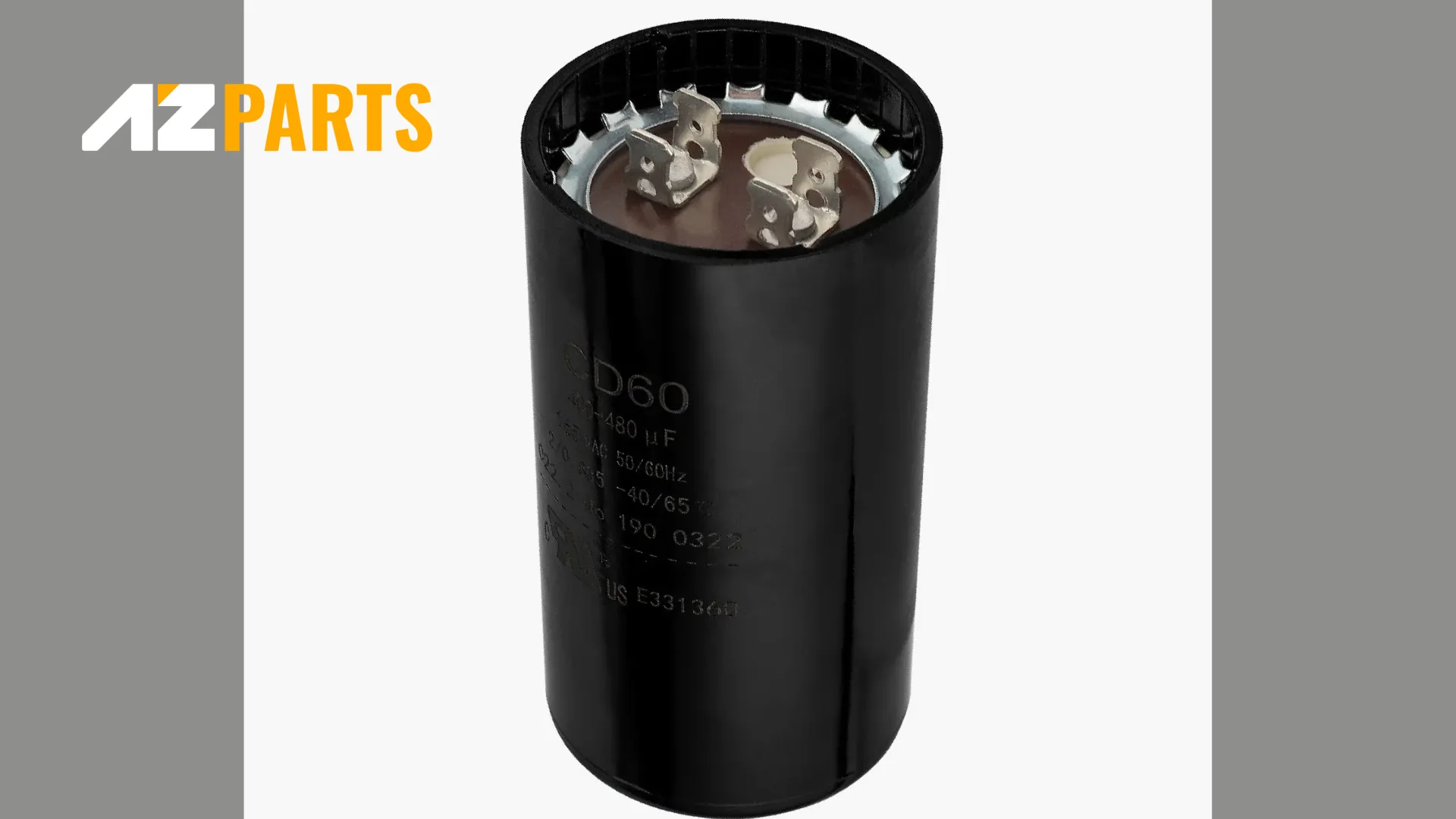
Understanding the difference between start and run capacitors
4. Signs You Have a Bad AC Capacitor
Recognizing the symptoms of capacitor failure can help you address issues before they cause additional damage to your air conditioning system. Several warning signs indicate when your AC capacitor needs attention or replacement.
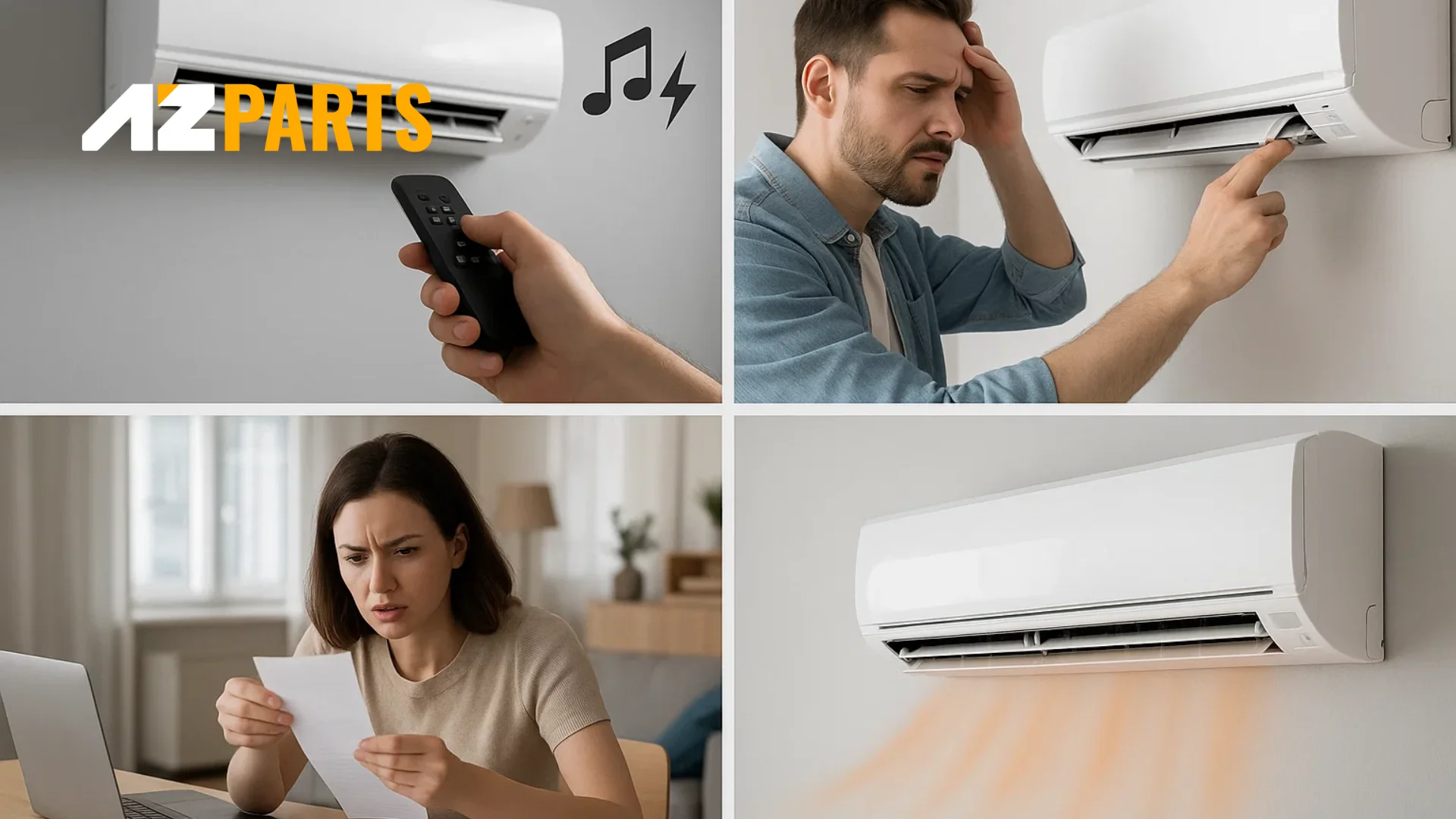
Signs You Have a Bad AC Capacitor (Source: AZParts)
4.1. Clicking or Buzzing Sounds
One of the most common indicators of capacitor problems is unusual sounds coming from your AC unit. A failing capacitor often produces clicking noises as the contactor attempts to engage but fails to provide sufficient power to start the motor. You might also hear buzzing or humming sounds when the system tries to start but cannot overcome the initial resistance.
These sounds typically occur when you first turn on the system or when it cycles on after being off for a while. If you notice these noises becoming more frequent or pronounced, it's likely time to have your capacitor inspected. Ignoring these warning signs can lead to more serious motor damage.
4.2. Difficulty Starting the System
A weakening capacitor will struggle to provide the electrical boost needed for motor startup. You might notice that your AC takes longer than usual to begin cooling, or it may start and stop repeatedly without completing a full cooling cycle. In severe cases, the system may not start at all despite receiving power.
This symptom often progresses gradually, with the system becoming increasingly unreliable over time. Initially, you might experience occasional startup delays, but as the capacitor continues to deteriorate, these issues become more frequent and severe.
4.3. Higher Electricity Bills
When capacitors begin to fail, motors must work harder to achieve the same cooling output, resulting in increased energy consumption. You might notice your electricity bills rising without corresponding changes in usage patterns or rate increases from your utility company.
Failed capacitors force motors to draw more current from your electrical system, creating inefficiency that translates directly to higher operating costs. This symptom is often overlooked because the increase may be gradual, but comparing recent bills to previous years can reveal the trend.
4.4. Blowing Warm Air
A failing capacitor can prevent your AC compressor from starting properly, resulting in the system blowing warm or room-temperature air instead of cool air. The fan may continue running, creating the impression that the system is working, but without the compressor operating, no actual cooling occurs.
This symptom is particularly frustrating because it defeats the primary purpose of your air conditioning system. If your AC runs but doesn't cool effectively, capacitor failure should be among the first components investigated.
5. How Do You Test an AC Capacitor?
Testing an AC capacitor requires proper tools and safety precautions, as capacitors can store dangerous electrical charges even when power is disconnected. Before attempting any testing, always turn off power to the unit and discharge the capacitor using an insulated screwdriver across the terminals.
The most reliable method for testing capacitors is using a digital multimeter with capacitance measurement capability. Remove the capacitor from the system and connect the meter leads to the appropriate terminals. Compare the measured capacitance to the rating printed on the capacitor label.
Visual inspection can also reveal obvious problems such as bulging, cracking, or leaking oil from the capacitor casing. These physical signs indicate immediate replacement is necessary, regardless of electrical testing results. Brown or black discoloration around terminals suggests overheating and potential failure.
For homeowners without electrical testing experience, professional diagnosis is recommended. HVAC technicians have specialized equipment and expertise to safely evaluate capacitor condition and determine appropriate replacement options.
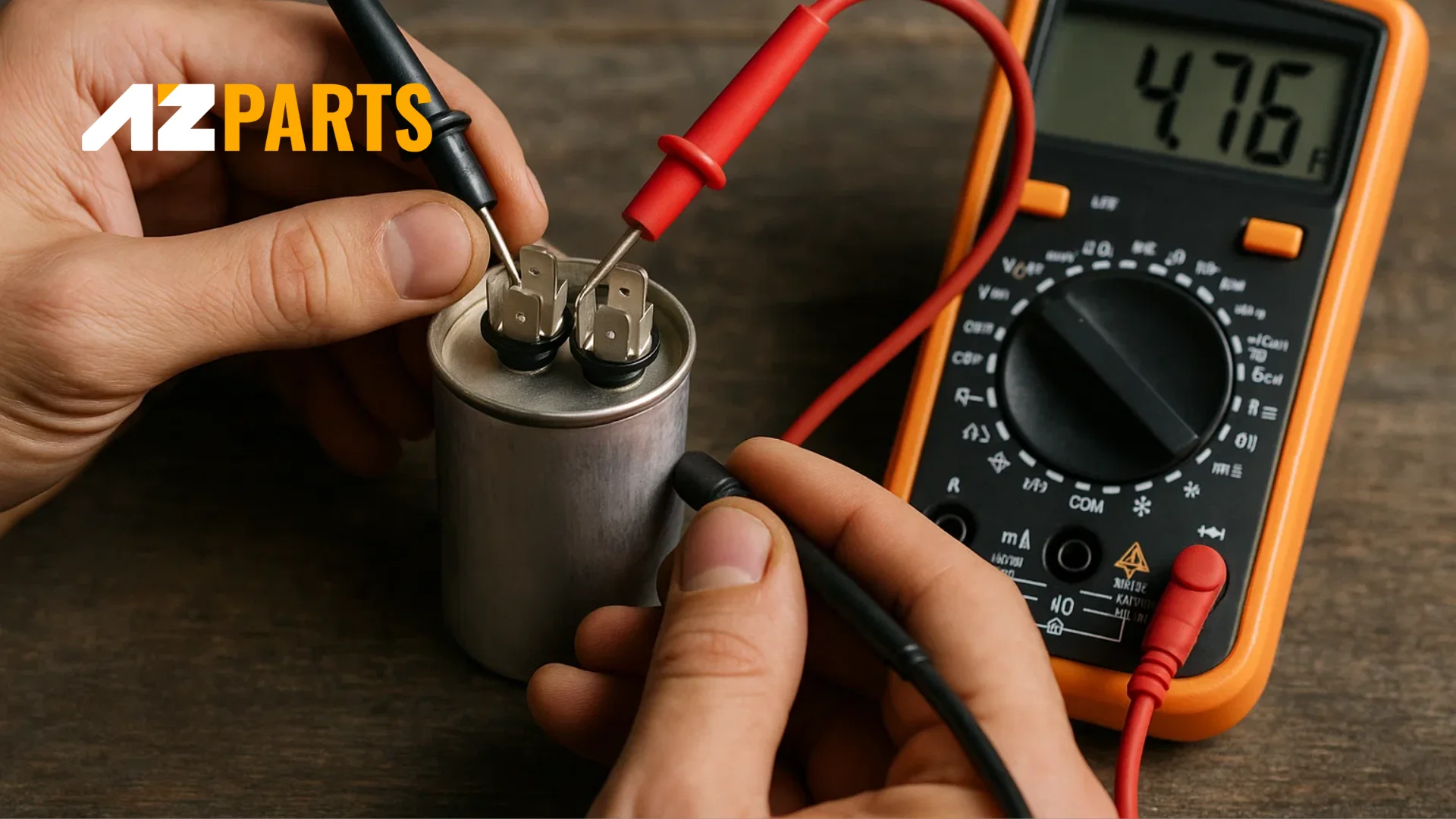
How Do You Test an AC Capacitor? (Source: AZParts)
6. How Much Does it Cost to Replace an AC Capacitor?
AC capacitor replacement costs vary significantly depending on whether you choose professional service or DIY replacement. Understanding these cost differences can help you make an informed decision that fits your budget and comfort level.
Professional Installation Costs: Hiring an HVAC technician for capacitor replacement typically costs between $150 to $400 for the complete service call. This total includes labor costs ranging from $75 to $200, plus the cost of the capacitor itself. According to industry data, most homeowners pay around $250 for professional capacitor replacement, including diagnosis, parts, and installation.
The higher cost reflects the technician's expertise, proper tools, warranty coverage, and comprehensive system testing to ensure everything works correctly after replacement. Professional service also includes safe disposal of the old capacitor and inspection of related components.
DIY Replacement Savings: Replacing the capacitor yourself offers significant cost savings. At AZParts, quality replacement capacitors range from approximately $10 to $30, depending on the type and specifications required for your system. This means you could save $120 to $370 compared to professional installation.
For example, if a professional service costs $250 total and you purchase a $20 capacitor from AZParts, you save $230 by doing the work yourself. This substantial savings makes DIY replacement attractive for homeowners comfortable with basic electrical work and safety procedures.
7. Can I Replace my AC Capacitor Myself?
Yes, you can replace an AC capacitor yourself by simply swapping out the old part with a new one. This is one of the more straightforward AC repairs that homeowners can handle with basic tools and proper safety precautions. The replacement process typically involves turning off power, removing the old capacitor, and installing the new component with matching specifications.
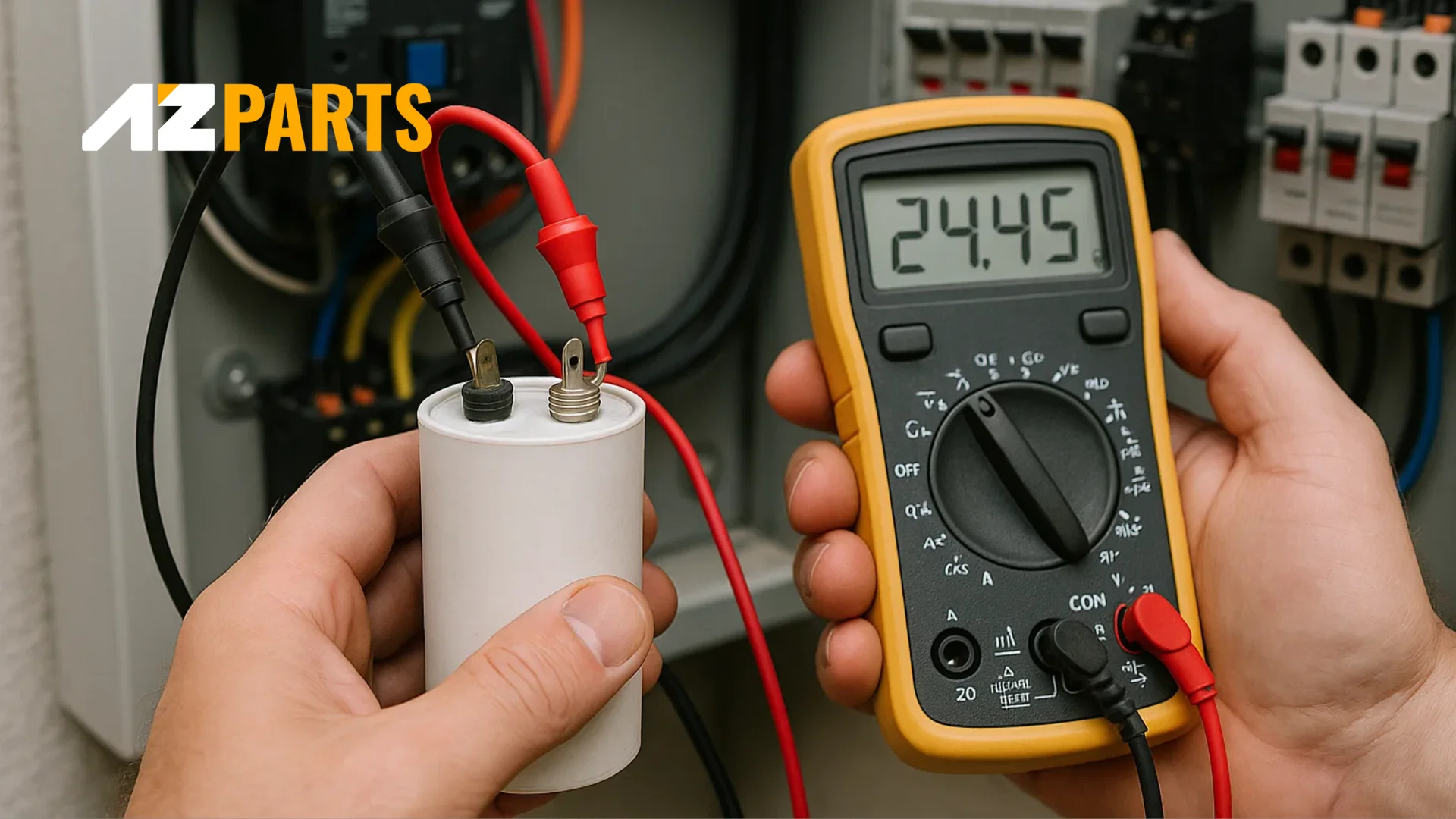
Can I Replace my AC Capacitor Myself? (Source: AZParts)
Start by shutting off power to your AC unit at both the disconnect switch and circuit breaker. Remove the access panel to locate the capacitor, which is usually a cylindrical component with wires connected to terminals. Take a photo of the wiring configuration before disconnecting anything to ensure proper reconnection.
Discharge the old capacitor safely using an insulated screwdriver across the terminals, then disconnect the wires and remove the mounting bracket. Install the new capacitor by reversing these steps, ensuring the voltage rating and microfarad capacity match the original specifications exactly.
However, if you encounter more complex issues involving motor problems, unusual electrical readings, or symptoms that don't improve after capacitor replacement, it's time to call a professional technician. Motor-related failures often require specialized diagnostic equipment and expertise that goes beyond simple part replacement. Professional help is also recommended if you're uncomfortable working with electrical components or notice signs of broader system problems during your inspection.
Understanding AC capacitors and their vital role in your air conditioning system helps you maintain optimal performance and avoid costly repairs. Regular inspection and timely replacement of failing capacitors ensure reliable cooling and energy efficiency throughout your system's lifespan. When you need quality replacement parts, trust AZParts to provide the reliable AC components necessary for professional repairs and maintenance.
Contact Information:
8 The Green, Ste A, Dover, Delaware 19901-3618, United States
Air conditioner
Further Reading
Further Reading





